Living in a Modern, Anxious World
At first, the bleeding felt manageable. Our winter snowpack had been below average, but nothing exceptional. But by the beginning of July, the snow line had already receded to a level more typically seen in mid-August. As the summer progressed, I slowly watched cracks break to the bedrock beneath as chunks of ice collapsed, amputated from the rest of the body. Stripped of their protective coating, the mass wasting accelerated. They became sunken, hollow, like the way someone’s face looks when you know you are seeing them for the last time. By August, there was no doubt that 2023 would be a historic year for glacial loss in the North Cascades.
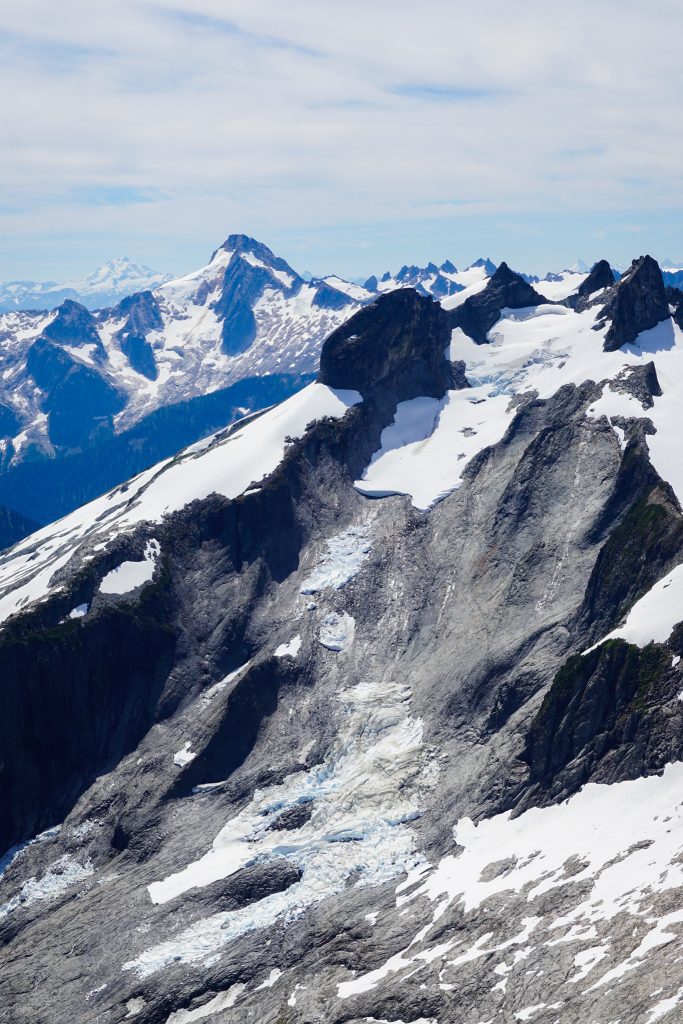
On an autumn run in the Glacier Peak Wilderness, I counted no fewer than a dozen patches of glacial ice, ranging from less than a football field to what was once as large as a small city, that appeared to be breathing their last breath. All the while, the bleeding continued, giving life to the landscape, cascading waterfalls over the rocky cliffs they polished clean in a past life. I filled my water bottle straight from the source, tasting water that had fallen as snow decades or centuries earlier. From the ice-sheet-carved Puget Sound Lowlands to the glacial-flood-carved coulees of Eastern Washington, the Pacific Northwest is a landscape created by glaciers. To witness the end of life for these ancient pieces of ice felt like the end of an era. I knew it was coming, but I just didn’t know it was coming this fast.
On the scale of world problems, the death of relatively small North Cascade glaciers is rather insignificant. Compared to most people in the world, I am fortunate that I will be relatively insulated from the effects of climate change, despite the fact I am as responsible as nearly anyone. I fully recognize that my concerns are pithy and small. But as Aldous Huxley said, “we can only love what we know”. And over the last decade, I have come to know our local mountains intimately. I have stood on the remnants of glaciers that few have ever stood upon or even heard of. I have found abandoned trails that have not appeared on a map for 50 years. I have learned of the vast changes that have occurred and are still ongoing – how this road washed out years ago, how this trail has been abandoned and reclaimed by the forest, how this route used to be passable before the glacier receded. It’s a loss that doesn’t really matter, but it matters to me. How can I care about the loss of niche recreation when so many others face existential threats? I feel guilty for caring about such selfish things (#firstworldproblems), but alas, it is something I know and love.
I don’t consider myself an anxious person. I don’t typically have trouble falling asleep at night. I don’t tense at each footstep I hear behind me on the street. I don’t stress about what I am doing with my life. I don’t worry that people secretly dislike me or don’t care about me. I am confident, self-assured, and comfortable in my own skin.
I used to worry about more things. I worried that each career decision would be irreversible. I worried that people would not accept me. I worried that I would never find a life partner. Back then, the mountains were an escape from those worries, where I only needed myself, freedom, and the vertical realms. But things have gradually changed. Ever since my fall on Sloan, I find myself triple checking handholds, imagining everything that could go wrong. I can feel the brush of an overgrown trail upstream from a bridge that washes out and never gets repaired. I can see the loss of access as a river meanders wider, undercutting a road. I can feel the void of a future snowpack that no longer forms reliably. I can imagine a view in that not so distant future where the ice is finally gone. With knowledge comes fear. It’s not that I cannot enjoy the mountains; I still love being out there. But I move through them with the distinct understanding that change is underway, even in these forever landscapes. Mountains used to be a sanctuary from fear and anxiety; now they are more a reflection of them.
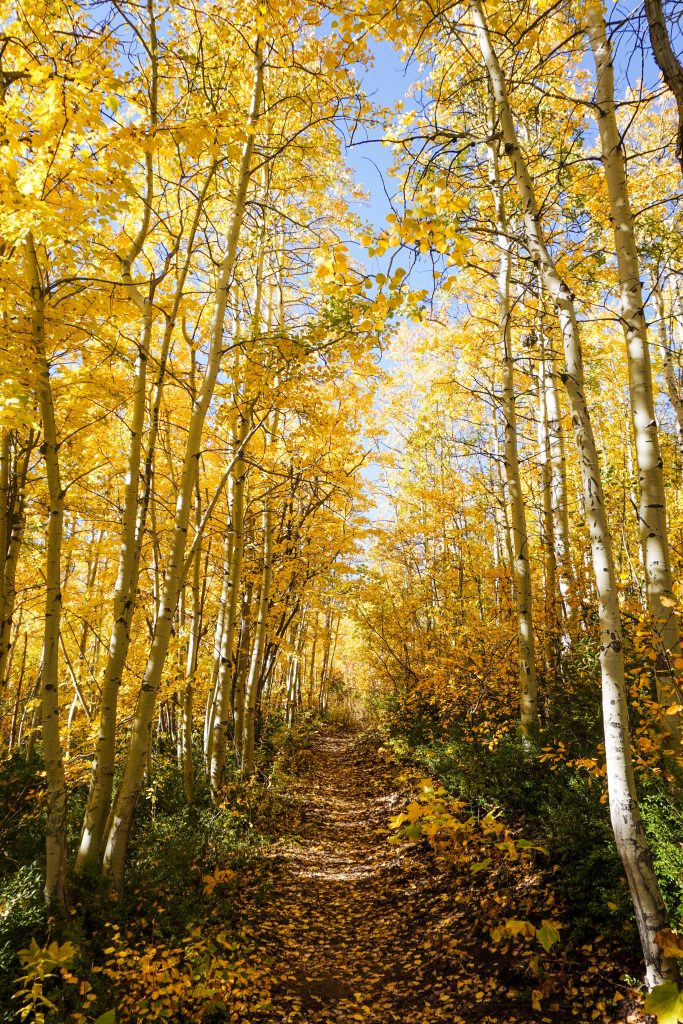
To grow up in the 21st century is to grow up in the era of anxiety. People certainly had more existential fears in the past. But they were immediate – run from the tiger lest it eats you! For people in the rich world, today’s fears burn slowly and nebulously. Largely, they are fears out of our immediate control. Media has weaponized our fears for profit and manipulation. There is always some crisis, some conflict, something to be worried about if you let yourself. Fear breeds suspicion, blame, and hate. Humans have not evolved to worry about things beyond our small 100 person tribe, or abstract problems in the future. We just are not meant to deal with this chronic stress.
At the core of our anxieties is the perception that for the first time in human history, our lives will not be better than our parents’. There is a sense of collective loss – loss of hope for a better life, loss of progress, loss of purpose. Desperately trying to mitigate the fall is much less inspiring than building upwards. But isn’t that what most of life is? I like to say that the only way is up, but we spend most of our lives going downhill. Maybe this loss is similar to what I feel about the mountains – like we are nearing the end of a golden era.
How does one live in an anxious world? What is worth worrying about? How do we balance the passivity of ignorance and the perils of knowing? How do we take care of ourselves and others? Existence, it turns out, is nothing but simple.
My family has had different fears and anxieties in its past. My father was born into the height of the Cold War when nuclear armageddon felt certain. My grandfather had classified knowledge about the conflict that only heightened the sense of impending mass destruction. My grandparents felt guilty bringing my dad into a world where they did not expect him to live long.
On the other side of the globe, in Camobida, my mother lived with a very different type of fear. When she was a young teenager, the Khmer Rouge began, forcing her and her family to leave behind their home in Phnom Penh for the Cambodian countryside, where they would spend their next four years in work camps and reeducation camps. Each day, she could have stepped on a landmine, gotten a deadly disease, or simply been shot for not working hard enough. Getting enough food to survive on a daily basis was a struggle. That all 11 members of their family survived this genocidal period where an estimated 25% of the population died is not just a remarkable story, but also a statistical improbability.
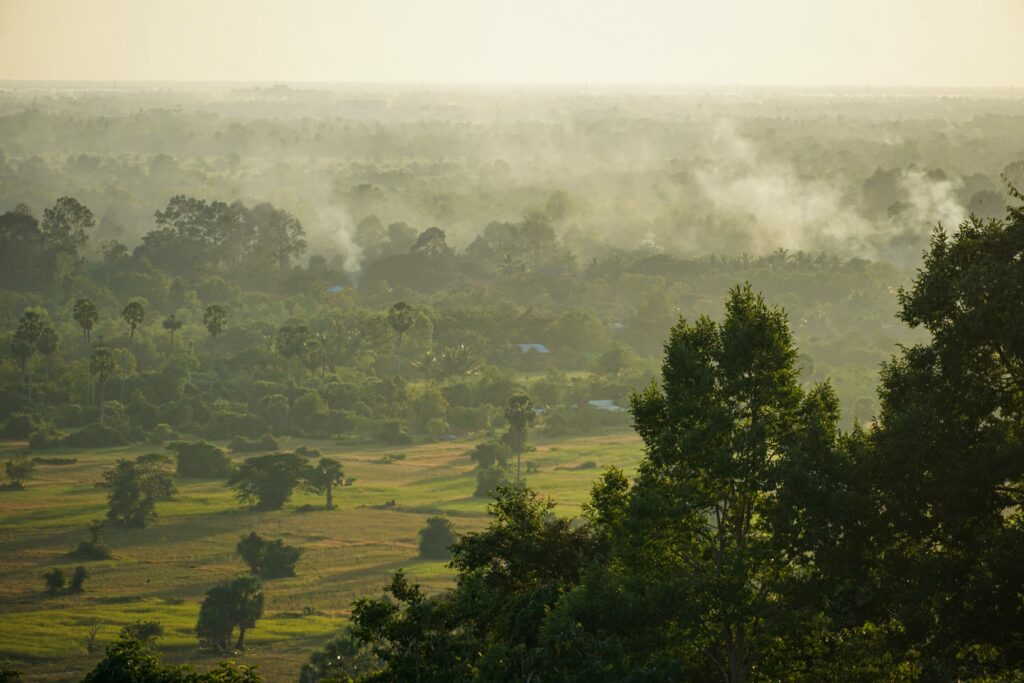
I mention these histories not to belittle the fears of our generation, but to highlight the responses to those fears. My grandparents chose to bring life into what felt like a bleak world, but they never regretted it. My mom’s family always came back together, even when the regime tried to break them apart. Fear can feel isolating. If relationships often end in pain, why introduce more liabilities? You can’t break my heart if I leave you first. But relationships are a way to mitigate the fear, to feel protected and connected. In the end, even the people that we love will depart. We cannot prevent the loss of many things we love, but at least we can still love each other.
In the face of such abstract fear, it can be immobilizing to take any meaningful action. Issues such as climate change are so grand, so institutional, so complex, that we often feel powerless as individuals. It is easy to become paralyzed by the fear, lost doom scrolling. Some climate scientists will even encourage climate concerned young people to consume less news about the climate crisis because the paralysis inhibits one’s ability to actually act. As humans with limited capacity, we have to choose the battles we care about and narrow our focus.
After feeling those anxieties around mountain recreation building, I looked for a way to create some positive change. At this point, I cannot slow the glacial recession in any significant way. I might be able to make an impact on forest health and forest fires, but I am not exactly sure how to do that. Ultimately, I decided to tackle the issue of access by starting the Cascade Backcountry Alliance.
Leading the Cascade Backcountry Alliance has been an interesting experience, to say the least. In some ways, it has made me more anxious, as I come to understand the complex challenges facing winter recreation access. But it also has given me a shared sense of purpose, a team of others to bond with through these challenges. Community is what catches us when we fall, but it is also what holds us up when we are on top. So far, it has been difficult to see any tangible impact from our efforts, but we are setting up the framework for more people to have an impact in the future – multiplying our impact.
The smaller the scale, the greater the impact we can have. Recently, I have been inspired by others to do some basic trail maintenance. It is simple, immediate, and tangible. Each downed tree I clear off the trail makes a difference. There are many other unrecognized “trail angels” spending weekends maintaining remote trails, doing far more work than me. If every hiker or runner in the PNW cleared just one short section of trail, we would be in a completely different place. Little things can grow into bigger things. The bigger problems need addressing, but for most of us, the smaller problems are where we can thrive. I don’t see these issues as a binary win / lose. They are a sliding scale of outcomes, and each person can move the needle.
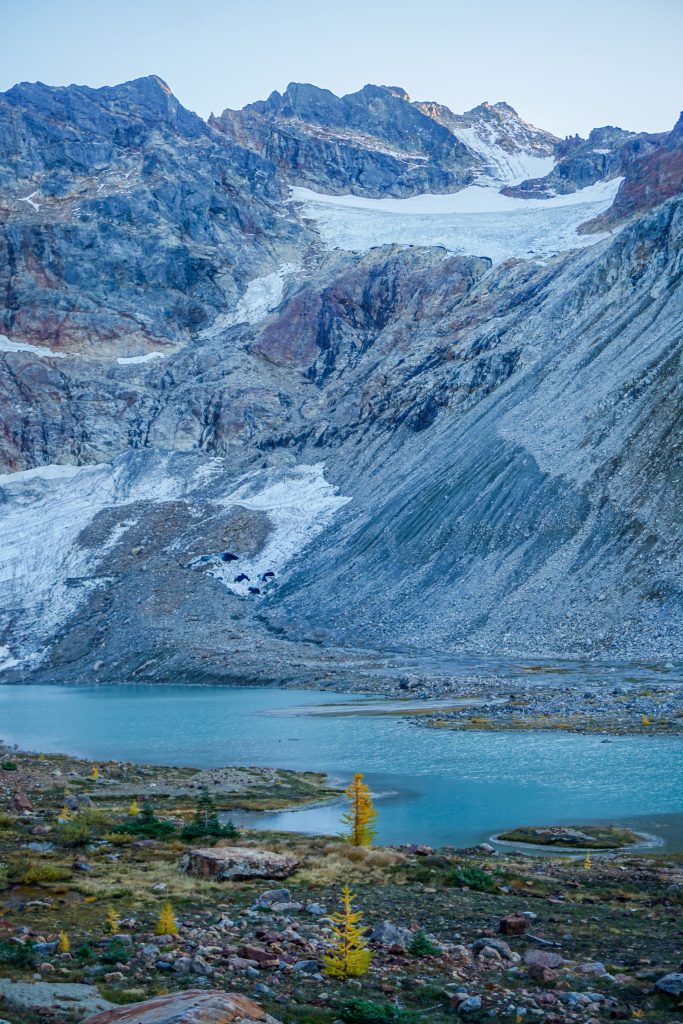
Sometimes I wonder if I should feel “hopeful” about the future. But maybe that is the wrong question to ask. The problems facing our world are significant, and most of them cannot be overcome. For some, life will end, but for others, life will continue on. “Hope is a verb with its shirtsleeves rolled up” said David Orr. Maybe hope is not something that we feel, but something that we embody. Hope is in our relationships, our actions, and ourselves.
Last fall, I slept upon fine gravel that was covered until recently by the now vanished Lillian Glacier in the Olympic Mountains. As the sun rose after a blustery night, I wandered across a young, thriving landscape. Luminescent green moss lined the streams of water emerging from the gravel. Overhead, a rainbow soared. While the knowledge of what once was brought sadness, the emergence of something new was inspiring. Without historical context, one would simply revel in the magnificence of such a landscape. Even in loss, there is beauty.
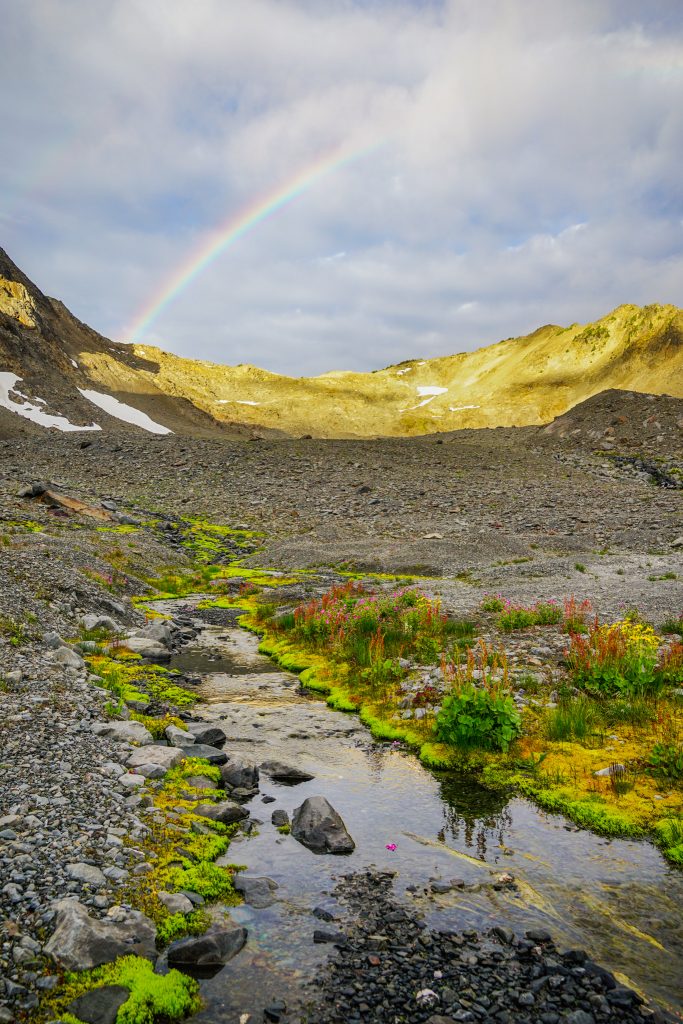
I don’t have the answers to the questions I posed earlier. And I don’t have solutions to the problems of our world. I am just trying to get to a place where I can move past the fear to a place of impact, however small it may be. There are a million different ways to live our lives. I want to live a life informed by fear, but not consumed by anxiety. I want to live a life of loving others instead of pushing them away. If the mountains of my life are a range of anxiety, then they are also a range of love, joy, and meaning.
To greater heights, to unforgettable sights.
The only way is up.
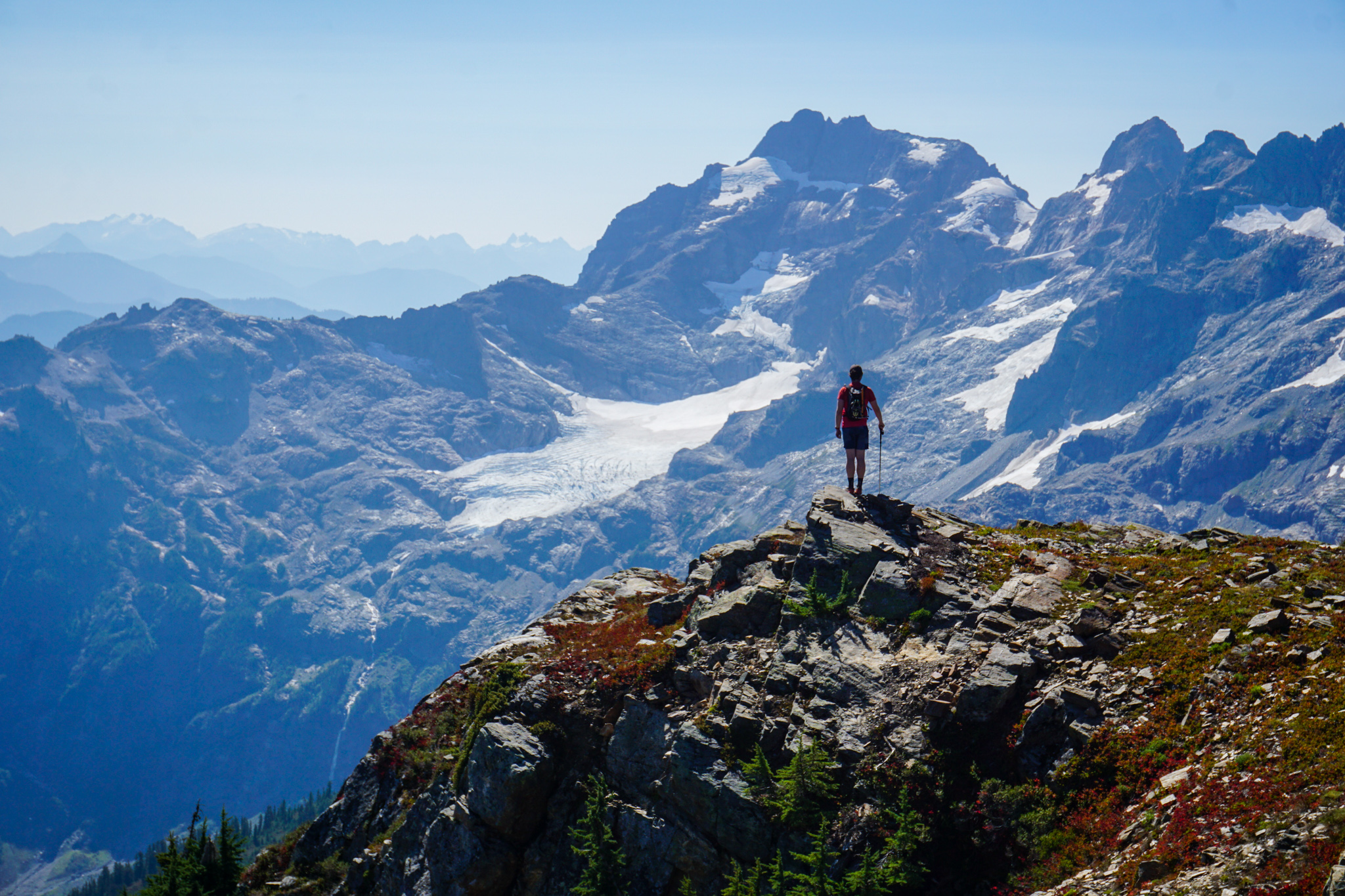
Love you blog… and your perspective. Thanks for the work you’re doing.
Thank you!
Congratulations on another thoughtful insightful post. Someone wise about two thousand years ago said. “To those that much has been given much will be required “. Keep up the good work. You are doing a great job.
Thank you for the kind words Erin!
Thanks for the lovely piece, kind sentiments and great attitude. You have lots to contribute, perhaps nowhere more than in words you are writing and images you are sharing. These can and do inspire and motivate positive action and change. Have a happy holiday.
Thank you Thom, that means a lot!
Brilliant essay. Thank you very much.
Thank you Don!
Loved this Entry Kyle, Hope you are well brother. I feel the same seeing the world change and the mountains. My perspective that I have created is to try to dance with it and flow with the ever changing environment and world. For me that is how I have managed my anxieties and fears, and to notice how everything, including myself, is always changing.
Thank Andrew! I hope you are doing well also. I feel like you always embodied that energy of going with the flow in a changing world.